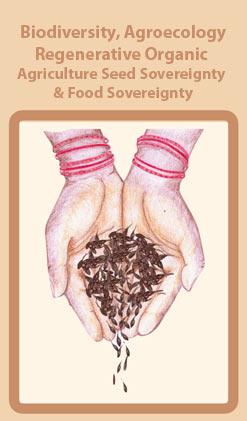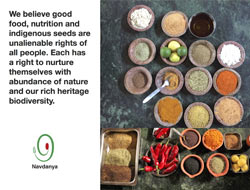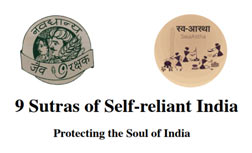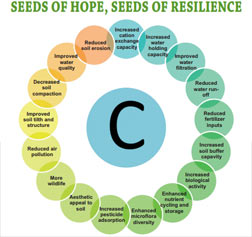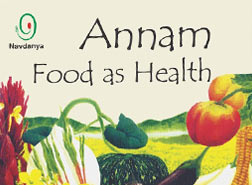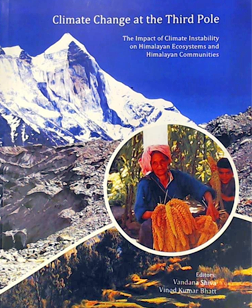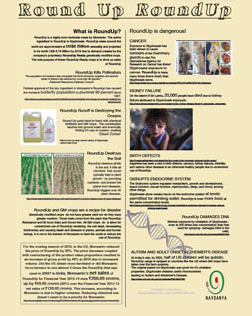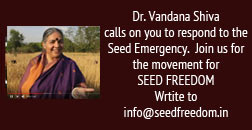PEOPLE’S CHARTER FOR FOOD AND NUTRITION SECURITY

The Global Conference on Meeting Nutritional Challenges with Sustainability and Equity was held on 2-3 August 2009 brought together 151 participants and experts representing India and other countries.
We, the participants included representatives from farmers groups, Rights based organizations, women’s groups and groups working on rights of children, public health, public interest groups, international groups and individuals. The objective was to understand the global and national causes of hunger and malnutrition as well as to evolve strategies to strengthen efforts to secure the human right to food.
This Charter has evolved as a result of the deliberations over two days on identifying critical areas that need political and government attention more than ever and urgently.
Preamble
The right to food is a birthright. It is a universal, fundamental human right without any boundaries.
The dominant patterns of production and consumption are causing environmental devastation, the depletion of resources, and a massive intensification of poverty.
The benefits of development are not shared equitably and the gap between rich and poor is widening, with the poor having to bear the negative impact of unjust development and unfair globalisation. Injustice, poverty, ignorance, and violent conflict are widespread and the cause of great suffering.
The world has committed itself to Millenium Development Goals 1, 4 and 5. The target is to halve, between 1990 and 2015, the proportion of people whose income is less than one dollar a day. However, according to the FAO, the number of people on the brink of starvation is set to reach a record high of 1.02 billion – or one-sixth of the global population – in 2009.
Today, almost a quarter of the world’s children, especially in Asia and Africa, do not get adequate food. In India, only about 20 percent of infants and young children are being fed optimally. Almost half the children under 5 years of age in India suffer from undernutrition. Two million children die before they reach the age of five. Out of that about one million die before the age of one month and two third of these deaths are related to inappropriate feeding practices.
Article 25 of the Universal Declaration of Human Rights (1949) recognizes the right of everyone to adequate food;
Article 11 of the International Covenant on Economic, Social and Cultural Rights (1966) and the General Comment 12 of the Committee on Economic, Social and Cultural Rights further elaborate the responsibilities of all State Parties to recognize the right of everyone to be free from hunger;
Further responsibilities in this regard, particularly with reference to children and women, derive from the Convention of the Rights of the Child (Articles 27.1 and 27.3) and the Convention on the Elimination of All Forms of Discrimination against Women (Article 12);
India is a signatory to the Universal Declaration of Human Rights, the International Covenant on Economic, Social and Cultural Rights and the Convention on the Rights of the Child.
Further, Article 21 of the Constitution of India guarantees a fundamental right to life which includes the right to health and its determining factors, including food.
Article 39 (a) of the Constitution of India obliges the State to direct its policy towards ensuring that the citizens, men and women, equally, have the right to an adequate means of livelihood
Article 47 of the Constitution of India makes it one of the primary duties of the State to raise the standard of nutrition and the standard of living of its people and to improve public health;
The need for a new synthesis
Science and governance related to food and nutrition in India has so far been fragmented.
Reductionism at the scientific level ends up with Green Revolution models and GMOs which actually reduce nutrition and limit the food basket to only cereals.
Reductionism in nutritional science has led to nutritionism where food is not seen as a system but only a composite of its nutrient parts, allowing quick fix single nutrient based solutions while the overall food system disintegrates and hunger grows.
Reductionist science has to be replaced by science that sees food holistically – from its production to its processing and consumption. Science based solutions can address hunger and malnutrition only if they are based on independent publicly funded research and not driven by corporate interests.
This reductionism promotes uniformity
- uniformity in the field making nutrition disappear from our farms
- uniformity in nutrition recommendations that ignore the diverse needs of humans at different stages of their lives and in diverse occupations, making nutrition disappear from our diet.
At the governance level the food system has been fragmented. The agriculture ministry focuses on crop production based on mono cultures and high cost inputs.
The food entitlement of the people of India (public distribution system) is looked after by Food and Consumer Affairs. The Ministry of Food Processing promotes industrial processing and corporate profits rather than nutrition. The ministry of Women and Child Development implements nutrition related schemes for women and child. The Human Resources Ministry implements the midday meal scheme for school children. The Health Ministry has nothing whatsoever to do with food and nutrition, though these are the very basis of health.
This fragmented governance has provided an opportunity to giant corporations to invade our food systems and undermine our food sovereignty and food security. An integration and coherence of governance thus becomes an imperative to safeguard our right to food.
Recalling the constitutional mandate of the Government of India and the commitments made to ensure human right to food, we, the people of India call upon the Government to secure the right to food for all her people through the following actions:
1. Safeguarding the sovereign rights of local food producers and communities to the land, water and biodiversity, to produce diverse foods and be paid fairly for their produce. Production of staple foods for basic needs should have priority over production for exports.
2. Ensuring that farmers have access to safe and renewable seed. GMO crops should be banned because of their health hazards and environmental risks as well as the intellectual property monopoly linked to them.
3. Ensuring livelihoods for all who can work, particularly in the unorganized sector, and ensuring that they are adequately paid to sustain life and their nutritional well being, leaving aside minimalist approach of granting welfare to them.
4. Ensuring universal public distribution system based on nutritional norms of above 2400kcal/person/day as well as the adequate protein and all nutrients, and accessed through diverse foods such as millet, pulses, dairy products, fruit and vegetables.
5. Ensuring inbuilt component of community participation and monitoring and social audits in all food, public health and nutrition related programmes.
6. Ensuring access to safe food produced without the use of chemical fertilisers and/or pesticides, which are always hazardous. The subsidies that promote toxic chemicals in agriculture should be stopped; instead incentives should be provided for the production of healthy, nutritious, safe organic food. Food safety and nutrition should be included in all health and food related curricula without commercial sponsorship and influence.
7. Removing barriers to accessing food, maintaining the price of basic foods like oil, grain, milk, pulses vegetable and eggs at levels that people can afford to buy, by abandoning the commodification of and speculation in food prices.
8. Ensuring that any food or ingredient introduced in public food and public health programmes undergoes strict holistic science assessment and is subject to regulation. No new chemical, industrial additive or fortified food or therapeutic food can be introduced in the public health and public food programmes till all conditions of providing adequate food and water are in place.
9. Ensuring that indigenous knowledge is identified, recognised, supported and promoted for addressing issues and practices in food production and nutrition leading towards sustainability and equity in food and nutrition security.
10. Ensuring access to safe water as a public good without any corporate led marketing of water.
11. Reviewing the World Trade Organisation’s Trade Related Intellectual Property Rights (TRIPs) agreement, the Agreement on Agriculture and the Sanitary and Phytosanitary agreement (Codex Alimentarius), given the harm they have done to the livelihood security of the small farmers, food producers, food processors, as well as to the food rights of people. The US India Knowledge Initiative in Agriculture which has on its board corporations like Monsanto, Cargill and Walmart, should be scrapped because it is promoting corporate profits at the cost of food sovereignty and public health. No new multilateral or bilateral free-trade agreement should be signed without democratic participation of the people and without an assessment of its impact on food security.
12. Developing a policy framework for identifying and managing conflict of interest in any agriculture, food, health and nutrition policy making and programming while interacting with corporate sector/private sector.
13. Ensuring the food and nutrition rights of all children of all age groups, particularly for the newborn, vulnerable infants and young children, through structural support to every woman which includes financial support during the first 6 months in lieu of maternity benefits like leave, skilled counselling and education on child care and breastfeeding, and crèches at community level and at work sites to enable women to fulfill their children’s rights to survival, care and development. Immediately implement the Supreme Court Order on universalisation of ICDS with quality and improve the quality and delivery of the mid day meals.
14. Ensuring the food and nutrition rights of women according to their different needs during their life cycle especially during pregnancy and breastfeeding period. All cards for food, livelihood and health entitlements for the family should be issued in the name of women.
15. Ensuring the food and nutrition rights of marginalised communities like dalits, disabled, destitute, displaced, tribal, nomadic and de-notified tribes, children in vulnerable situations, inmates of institutions, and so on, with dignity; the mechanisms for this should be developed in dialogue and in discussion with them.
16. Ensuring that existing national legislation is complied with and further strengthened by putting into place a mechanism for implementation and monitoring of existing Infant Milk Substitutes Feeding Bottles, and Infant Foods (Regulation of Production, Supply and Distribution) Act 1992 as amended in 2003, as a part of its obligation and commitment to CRC.
17. Ensuring independent and unbiased research by providing public funds. The source of funding for research studies which are used for programme inputs, should be verified to ensure that there is no conflict of interest.
18. Building Institutional Capacity, Strategy and Transparency: Government should also ensure that its institutions have the strategy in place for enhancing the nutrition capacity both in operational and strategic sense, and demonstrating its integrity and transparency towards its people and ensure their democratic right and participation. There should be a full declaration of interests. The fragmentation of governance related to agriculture, food, nutrition and health should be corrected by immediately converging and synergising programmes.
19. Ensuring that international bodies are not used to undermine food sovereignty and nutrition security. All interactions of government with any international or commercial body should be transparent and subject to democratic scrutiny. No industry representative should be in government delegations for any international negotiations such as CODEX. There should be no direct or indirect commercial participation in health, food and nutrition related policies at all levels of governance nationally.
20. Ensuring effective recourse mechanisms are available without discrimination of any kind starting from the hamlet and village up to the national and international levels.
The Food Security Act, being proposed by the Government of India should meet the needs of ALL human being ensuring their right to adequate and safe foods, taking into consideration all of the above demands.
August 3, 2009 New Delhi

